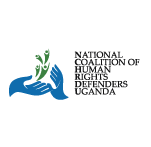- April 12, 2023
- Posted by: hrdcoalitionAdmin
- Categories: Tenders, TORs
Introduction
The National Coalition for Human Rights Defenders-Uganda (NCHRD-U) is a registered membership network organization that brings together about 160 individual members and organization what work towards the promotion and realization of human rights in the country. It was established in 2013 and works in all regions of Uganda and embraces all defenders regardless of color, race, gender, religion and political affiliation. It derives its legitimacy from Article 38 of the Constitution that states that:
Every Ugandan has the right to participate in the affairs of government, individually or through his or her representatives in accordance with the law. It further states that every Ugandan has a right to participate in peaceful activities to influence the policies of Government through civic organizations.
The Vision of NCHRD-U is a society that upholds the rights and freedoms of every human rights defender while its mission to protect and promote the work of HRDs in a safe and secure environment through linkages with national, regional, and international like-minded entities
Its Core Values are: Integrity, Inclusiveness, Confidentiality, Transparency and Responsiveness
The NCHRD-U institutional objectives are: To create an avenue for collective response to threats against HRDs, To coordinate other civil society organizations in promoting safety and security of HRDs, To improve protection mechanisms, safety, and security of HRDs in Uganda individually and at organizational level, To advocate and raise public awareness and profiles of HRDs in the country.
Introduction to Consultancy Assignment
Wellness is a multidimensional concept that encompasses physical, mental, emotional, and spiritual well-being. It is a state of being in which an individual can achieve their full potential and lead a fulfilling life. In an institutional setting, wellness refers to the promotion of healthy lifestyles and the prevention of not only illness and disease but mental health and adequate being to staff to enhance accomplishment of tasks that may draw to the organisation’s Mission and Vision.
The promotion of wellbeing for the staff and is to enable individuals to achieve their full potential and contribute to their social, cultural and economic development. Consequently, high priority on wellbeing promotion is prospected to improve services and resources to promote wellbeing in our institution to endeavour success at work and life hence the self-evaluation wellbeing promotion process we wish to venture into. The wellbeing policy and framework for practice will provide advice and direction for doing this.
Specific tasks for the facilitator.
- To develop the wellness and well-being policy and framework for implementation and practice
- To discuss the importance of wellness and wellbeing to the individuals and organisation.
- To discuss the role of the staff and institution in the promotion of wellness and wellbeing
- To align the institution’s mission, vision, culture and values in the promotion of wellness and wellbeing
- To draft a NCRD-U Staff wellbeing and wellness policy that among others aligns the institution’s mission, vision, culture and values in the promotion of wellness and wellbeing
- Orientation of staff on the draft policy. This should high light the role of Staff and NCHRDU in promotion of Staff wellness and well-being.
Key areas that should be included:
As a human rights defending institution it is key that certain key principles are embodied and included in the development process of the wellness and well-being policy and these include non discrimination, feminism, pro-feminist or pro- gender transformation, anti ableism , anti colonialism, Anti ageism. Analysis should be put on these specific areas;
- Physical Wellness: Promotion of physical health through regular exercise, healthy eating habits, and access to medical care. Institutions should provide facilities for physical activity such as gyms, sports fields, and walking trails. They should also promote healthy eating habits by offering nutritious food options in cafeterias and vending machines.
- Mental Wellness: Promotion of mental health through stress management techniques, counselling services, and support groups. Institutions should offer resources for stress management such as meditation classes, yoga sessions, or relaxation techniques. They should also provide access to counselling services for individuals who may be experiencing mental health issues.
- Emotional Wellness: Promotion of emotional health through social support networks and activities that promote positive emotions such as joy and happiness. Institutions should offer opportunities for social interaction such as clubs or extracurricular activities that promote positive emotions.
- Spiritual Wellness: Promotion of spiritual health through activities that promote self-reflection, meaning-making, and connection to something greater than oneself. Institutions should offer opportunities for self-reflection such as meditation or mindfulness classes. They should also provide spaces for individuals to connect with their spirituality such as chapels or prayer rooms.
- Environmental Wellness: Promotion of environmental health through sustainable practices that promote the well-being of the planet. Institutions should promote sustainability practices such as recycling, reducing waste, and using renewable energy sources.
Duration and deliverables.
Deliverables:
- 1. The wellness and well-being policy and framework developed for implementation and practice
- The importance of wellness and Well-being discussed with best practices to the staff and institution
- The role of staff and the institution to the promotion of wellness and Well-being discussed
- The institution’s mission, vision, culture and values embedded in the wellness and Well-being promotion
Duration:
The Consultancy is expected to take a duration of 21 working days which includes the activities and working modalities as the Consultant will advise.
Conclusion:
In conclusion, we are looking forward to a rejuvenating experience with a well-versed team that intends not to leave us the same more so much refreshed with the positive importance of this wellness exercise. By promoting physical, mental, emotional, spiritual, and environmental wellness, our institution should create a healthy and supportive environment to thrive.

